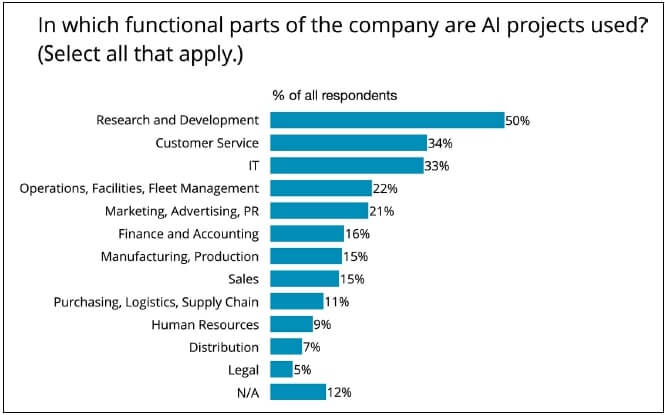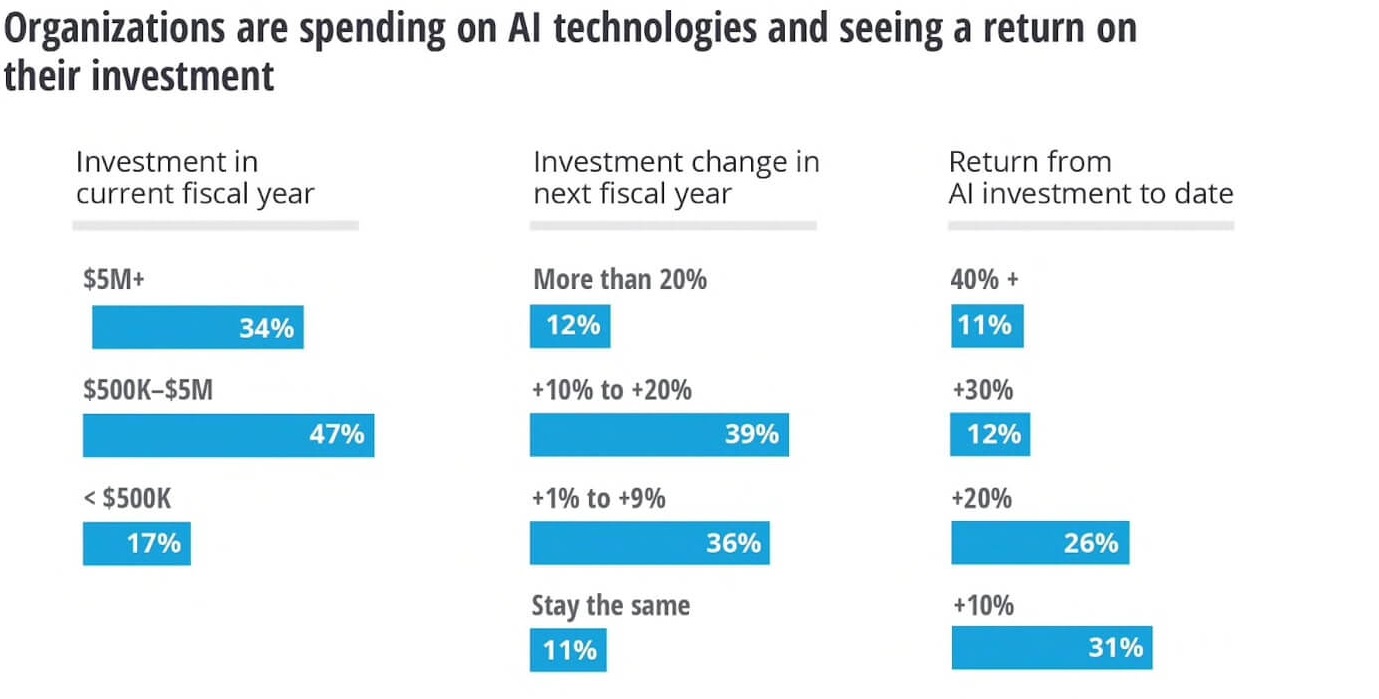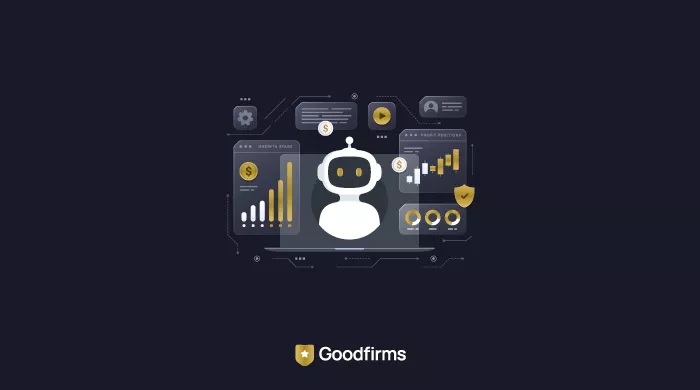We witness artificial intelligence (AI) changing digital environments. It leads us towards the future where monotonous jobs are automated with machine learning solutions. These autonomous devices and robotized solutions are infiltrating different aspects of living, and scientific communities rely much on AI to research and innovate.
Businesses go on investing in projects that harness AI capabilities.
Accenture forecasts that by 2035, AI will cause an increase in profitability at close to 38%.
IDC predicts that spending on AI systems will reach $79.2 billion in 2022 while growing annually.
Cooperation between AI and human employees can give organizations an impetus to reach new milestones. To date, plenty of organizations are at the stage of evaluating AI implementation. But whether early adopters, implementers of mature AI practices, or those just setting out to adopt AI, all face obstacles on their way to using AI technologies to get to a different level.
Where to implement AI considering industry specifics? How to plan your AI budget? What issues to anticipate? What talents to attract?
Read on to find answers and useful tips.
1. Use AI Technology to Tackle Bottlenecks in Business Processes
AI applications range from personalized recommendations on e-commerce web sites to voice searches by Google. In contrast, new opportunities are popping up almost daily.
That doesn’t mean AI is a silver bullet to spur business growth. But if implemented wisely, AI-driven automation, personalization, and the predictive capacity of AI inference can give you an edge over competitors.
Due to automation, certain functional parts of your company can expect the improvement of KPIs in the near term. According to the survey by O’Reilly, organizations tend to use AI mostly to assist researchers and developers, and also in customer service.

Source: O’Reilly
Besides, respondents implement AI in IT departments (33%), manage facilities and asset allocation (22%), upgrade marketing, and advertising (21%). There is a set of solutions and services to let the power of AI in every business.
OCR and NLP Can Do Your Paperwork
As a central technology for automatic text processing, optical character recognition (OCR) widely serves to automate workflows. The technology allows turning printed, handwritten, or scanned documents into the format machines can read and understand. You can exploit complex OCR-based solutions to capture and recognize barcodes, signatures, watermarks, bank cards, tickets, or cheques. It facilitates reading ID cards, passports, or payment forms as well as enables the autofill option to dodge common input errors. AII the data will automatically come into your CRM or other application where it can get verified and processed.
Information retrieved from documents can be in the shape of natural language or tables, diagrams, and symbols that complicate machine reading. Natural language processing (NLP) lets computers interact with different forms of human expression, mimicking the way humans do it naturally.
Computer Vision to Merge Realities
Computer vision, being a superbly efficient tool that enables computers to see, solves a whole range of tasks. It is pivotal in AR, VR, mixed reality (MR), OCR, and robotic vision.
Artificial realities blur the line between what is real and what is digital. Technologies enable a new approach to the cognitive process in education, including aesthetic knowledge, entertainment, consumer experience, immersive gaming experience, interactive media, and even construction and design in manufacturing.
Among sought-after aspects of the use of computer vision are action recognition, object detection, and emotion recognition. Those technologies enhance the work of marketing departments, boost brand exposure campaigns, help grasp real emotions and reactions of consumers to a new product or service.
Recommender Systems Help Win Customer Loyalty
Accurate recommending is what you need to personalize your content and offers. Such components of a successful business as customer experience, online strategy, mobile strategy, and marketing can get extra value from using custom recommender systems.
Such systems work based on big data. AI analyzes massive amounts of data and efficiently adapts itself to a specific digital environment and takes over the work of human employees in identifying market current trends and tendencies. AI helps save time and resources, takes routine off employee's shoulders, and enables human talents to do more sophisticated tasks.
Industry giants as Amazon, Netflix, or fashion leaders ASOS and H&M use recommender engines to offer consumers exactly what they want based on personal data or historical data. That helps them win new audiences and promote services. As evidence of their choice, SAS reports that a well-balanced recommender system may increase sales by up to 20%.
BI Solutions Inform Decision-Making
Using AI to augment data and analytics capabilities is one of the 10 Strategic Technology Trends listed by Gartner. Augmented analytics means applying powerful machine learning algorithms to explore more data and, instead of doing guesswork, let AI make accurate inferences.
Intelligent tools help businesses retrieve automated insights and eliminate personal biases. Examples of industry leaders dispel doubts regarding the efficiency of BI solutions. Walmart corporation processes massive volumes of transaction records with the help of BI. It has given warehouse operations under control of AI. General Electric owns a successful predictive maintenance strategy by allowing AI to handle the historical data on equipment.
2. Plan Your AI Budget
AI solutions are worth owning, but they are not for a zero budget. Currently, AI hugely impacts economic development and redefinition of job roles.
Deloitte conducted a poll among early adopters to clarify how they started their AI journey, the AI budget are they ready to spend, and the return on investment they are expecting. 51% of respondents expressed their readiness to increase investment in AI by 10% in the year to come.

Source: Deloitte
Nonetheless, the willingness of companies to pay for AI-led business success is out of the question. Many respondents even expressed concerns regarding such alarming aspects of AI implementation. It mostly included the lack of talents, security issues, data quality, and reliability of top-notch solutions.
3. Hire Talents in Data Science and Big Data Analytics
The leap in technology has lead to the AI skill gap. AI market faces the shortage of AI researchers, software developers, and data scientists, as Deloitte states it.
Business executives are also on the lookout for non-tech talents - department leaders, managers, creatives. They can bring together their knowledge and expertise in AI technologies to navigate the company.
One way to make up a team ready to face AI adoption challenges and work hand-in-hand with automated systems is to outsource data scientists, machine learning engineers, and prominent data consultants. Another way to guide your company's AI journey is to train and retrain your workforce.
The point here is to take into account the ethics of AI to tackle the downsides of embedding AI solutions into traditional workflows.
4. Your Data Is Your Main Asset: Keep it Secure
Data vulnerability and security is a burning issue, especially in the light of recent Facebook scandals. Exploiting big data means having access to large datasets of sensitive data, personal profiles, consumer history, payment data, and so forth. Governments of different countries work on data regulations at the legislative level, which is crucial to anticipate issues with processing and using data.
Despite cybersecurity vulnerabilities, AI adopters worry about the possibility of AI making wrong decisions. Whether in healthcare, finance, or logistics, that can lead to dire consequences.
“The main issue is who will be held responsible if the machine reaches the ‘wrong’ conclusion or recommends a course of action that proves harmful,” comments Matt Scherer, law firm Littler Mendelson P.C., for CIO. He speaks about the tendency of humans to believe in the intellectual superiority and infallibility of AI. According to him, such ‘blind trust’ is too reckless since AI-driven systems come up with decisions applicable to a certain case and depend heavily on input data.
5. Ensure High Data Quality and Data Availability
Seek to embrace the transformative power of AI, remember that a custom AI solution is only as good as the data used to create one. Carlo Torniai, Head of Data Science and Analytics at Pirelli, says that many challenges arise from data quality and availability, clear and measurable KPIs, and resistance to change. He highlights the importance of thinking beforehand what types of data machine learning engineers need to train a model and what are the best sources of valuable data.
On top of that, not all the data has predictive power. Organizations bump into hardships gathering insufficient or useless data, which can then make it arduous or impossible to train a model to make accurate predictions. Comprehensive datasets are a vital prerequisite to prepare input data and ensure the best results.
AI continues to develop actively and requires human interference on a decreasing scale. The range of its applications is becoming wider and wider from day-to-day. By automating and revamping your business processes with AI, you lay the foundation stone of the future well-being of your company.
You are welcome to use these 5 tips to be more confident in implementing AI in your business. To apply for assistance and cooperation and to acquire your feature-rich custom solution, you can turn to a provider listed among top big data analytics firms.








